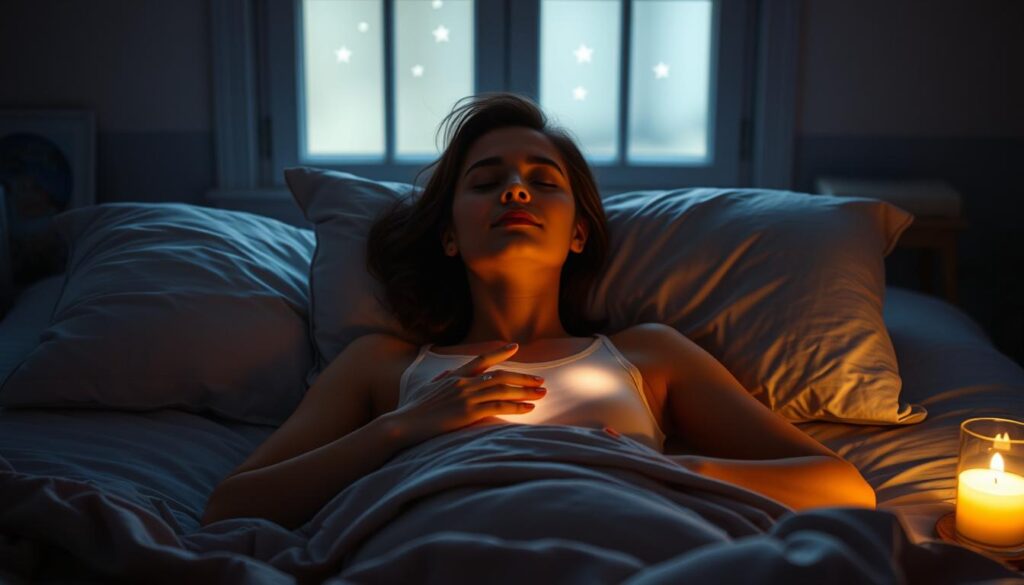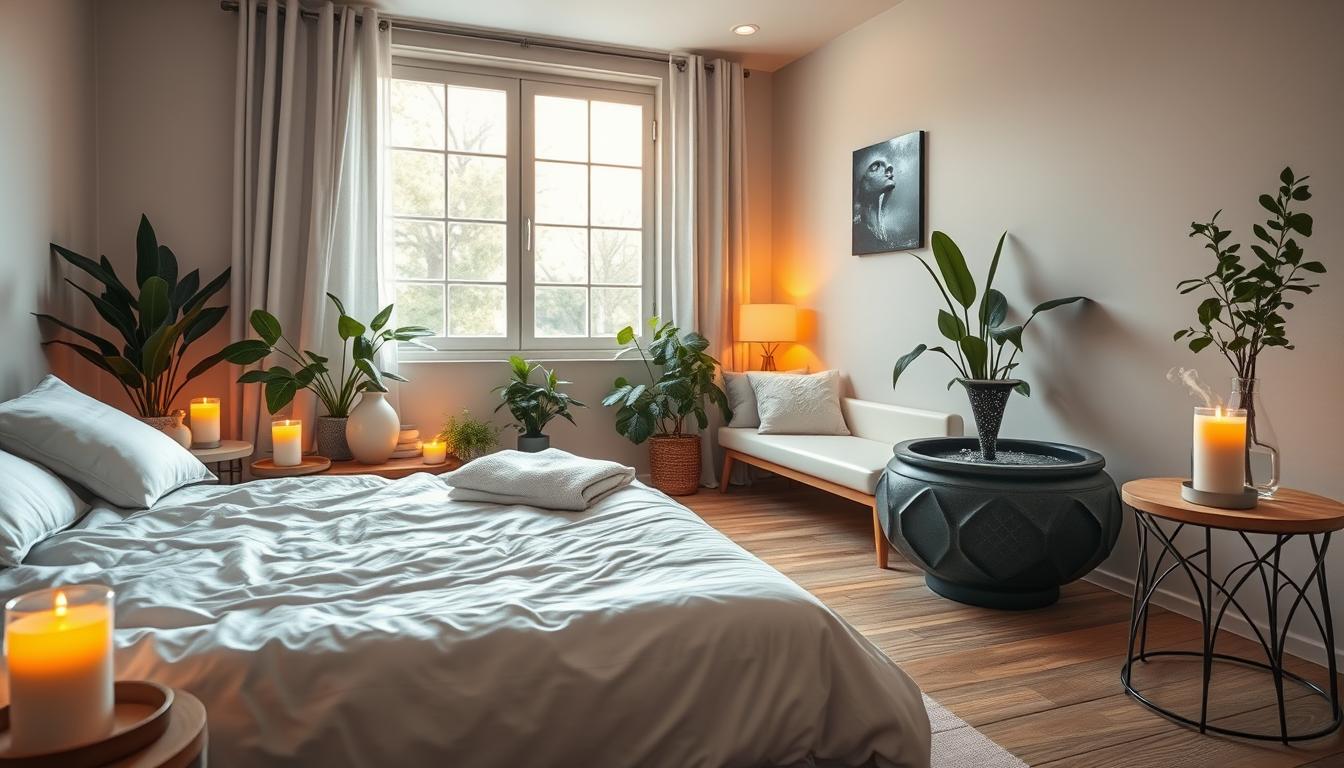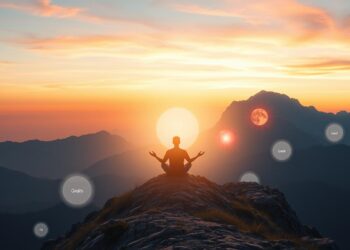“The best bridge between despair and hope is a good night’s sleep.” – E. Joseph Cossman
In today’s fast-paced world, getting quality sleep can seem like a luxury. But, with the right techniques, you can improve your sleep. These 10 methods can help you sleep better, whether you have insomnia or just want to sleep better.
Key Takeaways
- Chronic insomnia affects nearly one-third of adults, often due to stress and anxiety.
- Relaxation exercises can activate the body’s natural relaxation response, counteracting the effects of stress and promoting better sleep.
- Consistent practice of relaxation techniques is key for long-term sleep improvement.
- Creating an ideal sleep environment, free from distractions, can further enhance the effectiveness of relaxation methods.
- Incorporating a combination of relaxation techniques, sleep hygiene habits, and natural sleep aids can lead to more restful and restorative sleep.
Understanding the Science Behind Sleep and Relaxation
Sleep is key to our health and happiness, making up a big part of our lives. Experts like Dr. Mark Wu from Johns Hopkins are studying how sleep affects us. Knowing the science of sleep can help you sleep better and feel rested.
How Stress Affects Sleep Quality
Stress can mess with your sleep. It triggers the fight-or-flight response, releasing stress hormones. These hormones can make it hard to fall and stay asleep, leading to poor sleep.
The Role of the Relaxation Response
The relaxation response helps calm your body and mind, making sleep easier. Techniques like deep breathing and meditation can activate this response. They can improve your sleep quality.
Sleep Cycles and Natural Sleep Patterns
Sleep is not just one state but a series of stages. People go through REM and non-REM sleep about four to five times a night. Knowing these cycles and your natural sleep patterns can help you sleep better. Your body’s internal clock, or circadian rhythm, also plays a big role in sleep. Keeping a regular sleep schedule helps keep your rhythm healthy and improves your sleep quality.
Exploring the science of sleep and relaxation can help you understand what affects your sleep. Using relaxation techniques and knowing your sleep cycles are great ways to improve your sleep quality. They can help you get better rest and overall well-being.

Deep Breathing Exercises for Better Sleep
If you’re looking for better sleep, deep breathing might help. Deep Breathing Techniques, Diaphragmatic Breathing, and 4-7-8 Breathing can make it easier to relax and sleep.
Diaphragmatic breathing, or belly breathing, uses a big muscle at your lungs’ base. It can lower stress and help you relax, making sleep better. A 2013 study showed that nasal breathing exercises can reduce stress too.
- To try diaphragmatic breathing, sit or lie down comfortably. Place one hand on your belly and the other on your chest.
- Inhale slowly through your nose, letting your belly rise. Hold the breath for a few seconds.
- Exhale slowly through your mouth, feeling your belly fall. Do this for several minutes.
The 4-7-8 Breathing method is also great. Breathe in for 4 seconds, hold for 7, and breathe out for 8. This pattern calms your mind and helps you relax, making sleep easier.
“Persistence is key when incorporating breathing exercises into a nightly routine. It’s normal to have setbacks, but with practice, these techniques can become an invaluable tool for better sleep.”
Remember, breathing exercises are just one way to improve sleep. Regular practice is essential to enjoy the benefits of deep breathing for better sleep.

Progressive Muscle Relaxation
If you want to improve your sleep, try Muscle Relaxation Techniques like progressive muscle relaxation (PMR). This method, from the 1930s, helps relax your muscles. It reduces Tension Release and helps you relax.
PMR works by tensing and relaxing muscles. It’s hard to stay tense when your muscles are relaxed. This helps your body release physical and mental stress.
Step-by-Step Muscle Group Guide
Begin with your toes and feet. Move up to your legs, hips, stomach, hands, arms, shoulders, neck, and face. Tense each area for 5-10 seconds, then relax for 10-20 seconds. Breathe deeply while you do this.
Common Mistakes to Avoid
- Rushing through the exercise: Take your time and be mindful of each muscle group.
- Tensing muscles too hard: The goal is to gently engage, not strain, the muscles.
Benefits for Sleep Improvement
PMR can help a lot. It reduces muscle tension and anxiety. It also improves Sleep Quality.
Studies show PMR helps with depression, anxiety, and stress. It boosts well-being and mental health.
“Progressive Muscle Relaxation has been found effective for treating various conditions like tension headaches, migraines, temporomandibular joint disorder (TMJ), neck pain, insomnia, bipolar disorder, anxiety, backaches, and high blood pressure.”
PMR can change your bedtime routine. It helps with insomnia, racing thoughts, and anxiety. Try it and see how it improves your sleep.
Mindfulness Meditation Before Bed
Think about adding mindfulness meditation to your bedtime routine. It can calm your mind and body, making it easier to sleep well.
Mindfulness meditation focuses on the present moment without judgment. It helps you let go of worries and anxieties that keep you awake. Studies show it can lower stress and anxiety, helping you sleep better.
Begin with 5-10 minute sessions and increase as you get more comfortable. Try body scans, breath awareness, or guided imagery to help you relax. The goal is to make it a calming ritual that helps you sleep.
“Meditation may increase melatonin (the sleep hormone) and serotonin, reduce heart rate and blood pressure, and activate parts of the brain that control sleep.”
But mindfulness meditation isn’t for everyone, especially those with mental health issues. It can sometimes cause anxiety or mood swings. If you’re unsure, talk to a doctor before starting.
Regular mindfulness meditation can make your mind quiet and calm. Try different methods to find what works for you. Let it become a soothing part of your bedtime routine, leading to better sleep.
Relaxation Techniques for Better Sleep
Getting a good night’s sleep is key for your health. There are many ways to relax before bed to help you sleep better. Let’s look at some effective methods for deeper sleep.
Body Scan Meditation
Body scan meditation focuses on each part of your body. It helps you notice and release tension. Start by breathing deeply, then focus on your toes, feet, and legs, moving up to your head.
Pay attention to any tight spots. As you breathe, relax those muscles.
Guided Imagery
Guided imagery uses your imagination to calm you. Picture a peaceful place, like a beach or forest. Use all your senses to make it real.
This can quiet your mind and prepare you for sleep.
Gentle Bedtime Stretches
Doing gentle stretches before bed can relax your muscles. Try neck stretches, shoulder rolls, and twists. These can help you relax and prepare for sleep.
Try different relaxation techniques to find what works for you. With practice, you can create a calming bedtime routine. This will help you get the restful sleep you need.
Creating the Optimal Sleep Environment
Your sleep hygiene and bedroom environment are key to good sleep quality. A cozy, calm, and sleep-friendly space can help you sleep better.
Make sure your bedroom is dark, quiet, and cool. The ideal sleep temperature is between 60 to 67 degrees Fahrenheit. Try to keep it quiet and use a white noise machine if needed.
- Choose high-quality bedding, like a comfy mattress and pillows that support your neck and spine.
- Use blackout curtains or blinds to block out light, which can mess with your sleep cycle.
- Don’t use electronic devices like phones and tablets in bed, as they can affect your melatonin levels.
Also, add relaxing scents like lavender or chamomile to your bedroom. These can help you relax and sleep better.
| Factor | Optimal Range | Impact on Sleep Quality |
|---|---|---|
| Temperature | 60-67°F (15.6-19.4°C) | Temperatures outside this range can disrupt sleep |
| Noise | Quiet environment | Noise reduction can increase deep sleep and reduce nighttime wakings |
| Lighting | Darkness | Exposure to light, especially blue light, can suppress melatonin production and disrupt circadian rhythms |
By making your sleep environment perfect, you’re ready for a great night’s sleep. This can boost your sleep quality and make you feel better during the day.
Natural Sleep Aids and Aromatherapy
If you want to sleep better naturally, check out essential oils, herbal teas, and safe supplements. These options might help you relax and sleep better.
Essential Oils for Sleep
Essential oils like lavender, chamomile, and valerian root can calm you down. Use them in a diffuser or mix with a carrier oil for a massage before bed.
Herbal Tea Recommendations
Drinking herbal teas like chamomile, passionflower, and lemon balm can soothe you. They might help you feel less anxious and more relaxed, leading to better sleep.
Safe Natural Supplements
Supplements like melatonin, magnesium, and valerian root might support healthy sleep. But, always talk to a doctor before taking new supplements. They can help you choose the right ones and make sure they’re safe.
While natural sleep aids can help, don’t forget to keep good sleep habits. Also, address any health issues that might be affecting your sleep. Changing your lifestyle and getting advice from a doctor are key to better sleep.
Bedtime Yoga and Gentle Movement
Unwind with Yoga for Sleep to get ready for a good night’s rest. Gentle yoga and Bedtime Stretches ease muscle tension and calm your mind. They also help regulate your breathing, key for quality Relaxation Exercises before bed.
Try to do 10-15 minutes of gentle yoga each evening. Choose poses like Child’s Pose, Legs-Up-the-Wall, and Supine Twist. These poses calm your nervous system, improve blood flow, and help your mind relax, making for better sleep.
Doing yoga at bedtime can make your sleep cycle stronger and improve sleep quality. A national survey found that over 55% of people who did yoga slept better. This shows yoga’s power in helping you sleep well.
Pair your yoga with the Bía Smart Sleep Mask for even better sleep. It uses Neurofeedback technology to improve your sleep stages. This combo can make your sleep more refreshing and restful.
Recommended Bedtime Yoga Poses
- Balasana (Child’s Pose): Soothes the nervous system and promotes relaxation.
- Viparita Karani (Legs-Up-The-Wall Pose): Boosts circulation and brings deep calm.
- Paschimottanasana (Seated Forward Bend): Stretches the spine and calms the mind.
- Savasana (Corpse Pose): The ultimate relaxation pose for deep rest and rejuvenation.
Focus on deep breathing and slow movements for the best relaxation from your bedtime yoga. Regular practice strengthens your sleep-wake cycle and boosts sleep quality.
“Practicing yoga before bed can reduce stress, alleviate physical tension, and decrease anxiety, contributing to better sleep quality.”
Evening Routine Optimization
Creating a bedtime routine is key for better sleep hygiene and a regular sleep-wake cycle. Relaxing activities in the evening tell your mind and body it’s time to sleep. This helps you get a good night’s rest.
Stay away from caffeine, alcohol, and big meals before bed. They can mess up your sleep quality. Also, cut down on blue light from screens like phones and computers two hours before bed. Instead, try reading, listening to calm music, or taking a warm bath to relax.
Stick to a regular sleep schedule, even on weekends. Going to bed and waking up at the same time every day helps your body’s clock. Activities like journaling or meditation can also help you relax and sleep better.
By improving your evening routine with these tips, you can boost your sleep hygiene. This leads to better, more refreshing sleep.
| Recommended Bedtime Routine Activities | Benefits |
|---|---|
| Reading a book | Reduces stress levels by up to 50% in 6 minutes |
| Practicing meditation or mindfulness | Improves sleep quality and helps with insomnia |
| Taking a warm bath | Promotes relaxation and better sleep |
| Listening to calming music | Lowers blood pressure and reduces stress |
“A good night’s sleep is essential for maintaining physical and mental health. By prioritizing a consistent bedtime routine, you can unlock the restorative power of sleep and wake up feeling refreshed and rejuvenated.”
Mind-Calming Techniques
If you’re having trouble with stress, anxiety, or racing thoughts at night, try some mind-calming techniques. Stress Management, Anxiety Relief, and Sleep Improvement can be achieved with simple practices. These help calm your mind before bed.
Journaling Practices
Journaling before bed can be very helpful. It lets you process your thoughts and feelings. Write down your to-do lists, express gratitude, or just write what’s on your mind. This quiets your inner chatter and gets you ready for sleep.
Worry Time Scheduling
Set a specific “worry time” earlier in the day to tackle concerns. This stops nighttime worries and lets you sleep better. If worries come up later, remind yourself you’ve already dealt with them.
Thought Stopping Methods
When negative thoughts come, use thought-stopping techniques. Imagine a stop sign or snap your fingers to stop the thoughts. Then, think positive thoughts or calm images to help you relax.
Adding these techniques to your bedtime routine can help with Stress Management, Anxiety Relief, and better Sleep Improvement. You’ll sleep more peacefully.
Conclusion
Using a mix of relaxation techniques can really help you sleep better. Try out different methods to see what works for you. It’s important to make these exercises a part of your bedtime routine every day.
Remember, it takes time and patience to get better sleep. If you’re still having trouble, talk to a healthcare professional. They can offer more help and advice.
Adding sleep improvement and relaxation to your daily life can change your wellbeing. By focusing on good sleep habits and creating a cozy sleep space, you’ll get better rest. Start this journey for better nights and more energy every day.
Stick with the sleep tips from this article. With effort and care for yourself, you can get the sleep you need. Good luck on your path to better sleep and relaxation.
FAQ
What are the key relaxation techniques for better sleep?
Top relaxation techniques for better sleep include deep breathing and progressive muscle relaxation. Mindfulness meditation, body scanning, and visualization are also effective. Gentle stretching routines can also help.
How does stress affect sleep quality?
Stress makes it hard to fall and stay asleep. It activates the body’s fight-or-flight response. The relaxation response, which promotes calmness, counteracts this.
What is the role of the relaxation response in sleep?
The relaxation response helps calm the body and mind. It counteracts stress. Relaxation exercises can activate this response, leading to better sleep.
How do sleep cycles and circadian rhythms impact sleep quality?
Understanding sleep cycles and maintaining a consistent circadian rhythm is key. This improves sleep quality. Sleep cycles include REM and non-REM stages.
What are the benefits of deep breathing exercises for sleep?
Deep breathing, like diaphragmatic breathing and the 4-7-8 technique, reduces stress. It promotes relaxation and prepares the body for sleep.
How do I properly practice progressive muscle relaxation?
Start with the toes and feet in progressive muscle relaxation. Tense each muscle group for 5-10 seconds. Then relax for 10-20 seconds.
What are the benefits of mindfulness meditation for sleep?
Mindfulness meditation calms the mind and body. It reduces stress, anxiety, and racing thoughts that disrupt sleep.
What other relaxation techniques can I try for better sleep?
Try body scanning, visualization, and gentle stretching before bed. These can be used alone or together to create a personalized routine.
How can I create an optimal sleep environment?
Ensure your bedroom is dark, quiet, and cool. Invest in a comfortable mattress and bedding. Minimize external noise and light for better sleep.
What natural sleep aids and aromatherapy options are available?
Essential oils like lavender and chamomile promote relaxation. Herbal teas and natural supplements like melatonin can also improve sleep. Always check with a healthcare professional before trying new supplements.
How can bedtime yoga and gentle movement help with sleep?
Gentle yoga and stretching relax muscles and calm the mind. Focus on poses for the neck, shoulders, and lower back to improve sleep.
What steps can I take to optimize my evening routine for better sleep?
Establish a consistent bedtime routine. Avoid caffeine and large meals before bed. Limit screen time and blue light exposure. Engage in relaxing activities like reading or listening to calming music. Keep a consistent sleep-wake schedule.
How can mind-calming techniques like journaling and thought-stopping help improve sleep?
Journaling and scheduling a “worry time” can clear the mind. Thought-stopping techniques also help manage racing thoughts and worries that can disrupt sleep.




























































